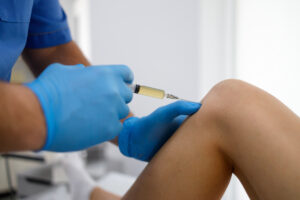
Plantar fasciitis is a common cause of heel pain that occurs when the thick band of tissue (plantar fascia) at the bottom of your foot becomes inflamed. This condition often results from overuse or stress, leading to sharp, stabbing pain in the heel, especially in the mornings. While traditional treatments like stretching and orthotics help, Platelet-Rich Plasma (PRP) therapy has emerged as a revolutionary option for long-term relief.
What is PRP Therapy?
PRP therapy involves using your body’s own healing factors to promote tissue repair. A small amount of your blood is drawn and placed into a centrifuge to isolate platelets, which contain powerful growth factors. This concentrated solution is then injected into the affected area to accelerate healing and reduce inflammation.

How Does PRP Therapy Help Plantar Fasciitis?
PRP therapy helps plantar fasciitis by stimulating the body’s natural healing processes. The growth factors in PRP injections help regenerate damaged tissue in the plantar fascia, reducing pain and inflammation. Unlike temporary solutions, PRP offers lasting relief by addressing the root cause of the problem.
Benefits of PRP therapy for foot pain relief include:
- Reduces Inflammation: PRP targets the inflammation causing foot pain.
- Stimulates Healing: Encourages the growth of new, healthy tissue in the plantar fascia.
- Minimally Invasive: A simple injection that avoids surgery.
- Long-Lasting Results: Many patients experience significant pain reduction with lasting effects.
If you’re tired of dealing with chronic heel pain, PRP therapy could be the game-changer you need for long-term foot pain relief from plantar fasciitis.
 Learn More
Learn More
Contact Advanced Orthopedic and Sports Medicine Institute (AOSMI) today to see if PRP is the right treatment for you. AOSMI serves patients throughout New Jersey, with convenient locations in Freehold, Monroe Township, Toms River, Belmar, Edison, and Manalapan.







